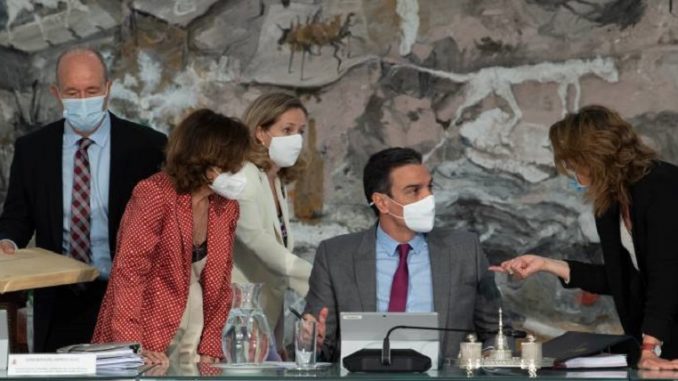
By Rubén Tzanoff SOL Spanish State
The debate of the pardon has long held a central place on the political stage. Pedro Sánchez was preparing the ground for its implementation with the aim of “reestablishing harmony and coexistence within Catalan and Spanish society.” So much so that the Council of Ministers held on Tuesday 22 gave the green light to the pardon and the Spanish president presented it in La Moncloa as a necessity based on “reasons of public utility”. Once the decision is officially communicated by the Executive Power, the Supreme Court will agree to release the independentists imprisoned in Lledoners, Wad Ras and Puig de les Basses: Oriol Junqueras, Joaquim Forn, Raül Romeva, Jordi Turull, Josep Rull, Jordi Cuixart, Jordi Sánchez, Teresa Forcadell and Dolors Bassa.
Obviously it is a relief for the nine unjustly imprisoned political prisoners, but at the same time it is a trap to deepen the policy of “turning the page” of 1-O. It is a gesture towards those who were subjected to a sham trial, mounted on invented, false and vindictive causes. The truth is that the pro-independence leaders were jailed for defending their political ideas and the right to self-determination. For this reason, more than the “magnanimous” pardon of Sánchez and the ’78 regime, what is needed is to annul all criminal cases, free the political prisoners and stop persecuting exiles and activists.
You may be interested in: España: a 10 años del 15M, varias concusiones y un epitafio
It is necessary to clarify that pardons are reversible, that is, they are conditional on the convicted political prisoners not repeating “what they did”, which implies a new violation of their democratic rights. Just to take an example, in his trial Jordi Cuixárt said “Ho tornarem a fer” (We will do it again) which implies that, if he follows suit, they will want to imprison him again. The pardon is not complete, the crimes of “embezzlement” and “sedition” will be left aside, but the disqualification for the crime of “disobedience” will be maintained. In addition, the exiled Catalan politicians will not be pardoned: Carles Puigdemont, Toni Comín, Lluís Puig, Clara Ponsatí, Marta Vilalta and Anna Gabriel. Nor will the cases of around 3,000 popular activists be annulled, among others, Marcel Vivet, sentenced to five years in prison for a demonstration against the Jusapol police union, where the Generalitat acted as a private prosecution.
The right and the far right of the PP, Ciudadanos and Vox, use miserable arguments for political prisoners to continue to exist and for the repression to deepen; they threaten to file lawsuits in the Criminal Chamber of the Supreme Court and other appeals. The need to defeat them in the streets, with popular organization and mobilization, to keep them from gaining ground is increasingly reaffirmed.
The pardons are part of a package of decisions: the “dialogue table”, the intention to adopt a new statute of autonomy and negotiations at the political and economic level, maintaining the persecutory pulse, but momentarily in the background. Pedro Sánchez does not apply the same policy as Mariano Rajoy (PP), but the strategic objectives are the same: deactivate the mobilization of the Catalan people, bury the demand for the Republic and the 1-O mandate for self-determination. All under the sacrosanct cloak of the unity of Spain and the support of the decomposed monarchical-parliamentary regime designed by the Franco regime. With some other nuance, the reformists of Unidas Podemos, UGT, CC.OO., business and ecclesiastical sectors have joined in supporting the lines of central power. They are at the opposite extreme of presenting the pardon for what it is: a new maneuver by the Spanish State to impose its interests.
This policy could not be implemented without the collaboration of ERC, with its “blank checks” to Sánchez and his Budgets, and without the inconsistencies of JxCat. It is no coincidence that they command a bourgeois Govern together that privileges the profits of a handful of capitalists over the lives and needs of the working people. That does not privilege education, or public health, even in the midst of the Covid-19 pandemic. No confidence can be placed in those who shout a “pro-independence” discourse to camouflage an “autonomist” policy. Unfortunately, the CUP is oscillating between the contradiction of maintaining a dialogue consensus with the Govern, while at the same time raising positions of struggle and some anti-capitalist proposals.
Throughout the Spanish State, we need to build a new anti-capitalist and consistent political alternative of the left. SOL and the ISL (International Socialist League) will continue promoting the recovery of the gigantic mobilizing potential of the Catalan people to achieve the annulment of all cases against the persecuted, the exiled and the political prisoners, for self-determination and the Republic. All this on the road to a strategic solution: a government of the workers and the people with the only system that can guarantee full rights for the great majority: socialism with democracy. Building a great revolutionary and socialist party is the great task to undertake every day to change course and turn everything around.








